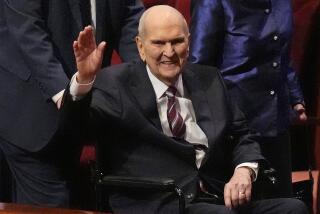Religious freedom under siege, Mormon leader says
The Church of Jesus Christ of Latter-day Saints threw itself into the public square in 2008, when it played a central role in the campaign for Proposition 8, which outlawed same-sex marriage in California. Mormon support helped win that battle, but one of the church’s top leaders is worried about losing a much larger struggle.
Elder Dallin H. Oaks, one of 12 leaders, known as apostles, who help govern the Mormon Church, delivered his message Friday in a speech at Chapman University in Orange: The 1st Amendment right to freedom of religion is under siege, he said, threatened by a growing secularization of society and constrained by the inroads made by a vigorous gay rights movement.
“For some time,” he said, “we have been experiencing laws and official actions that impinge on religious freedom.”
Oaks, a former law professor and Utah Supreme Court justice, has been making speeches along these lines for more than 25 years, and says the climate has been getting worse for religious rights. “It was apparent 25 years ago, and it is undeniable today,” he said.
Some may find his timing odd, coming after the church’s ballot box victory in California and at a time when the Mormons are experiencing unprecedented success in other realms. Membership is growing, with surveys showing that slightly less than 2% of Americans now identify themselves as Mormons. And there is the real possibility that two Mormons, former Gov. Mitt Romney of Massachusetts and former Utah Gov. Jon Huntsman Jr., may run for president in 2012, suggesting a level of acceptance in American society that was once unthinkable.
But Oaks’ concerns, he said, are not specific to Mormonism and apply equally to other faiths. “It is easy to believe,” he said, “that there is an informal conspiracy of correctness to scrub out references to God and the influence of religion in the founding and preservation of our nation.”
Oaks’ speech received a standing ovation from his audience of about 800 law students, lawyers and others at Chapman’s Memorial Hall. He clearly was tapping into a concern of many Americans: A 2008 Pew survey found that the country was almost evenly divided on the question of whether religious influence on government was increasing or decreasing. Among those who saw it decreasing, the majority said it was a bad trend.
But many Americans find little evidence that religious liberty is threatened.
“I hadn’t noticed that,” deadpanned Annie Laurie Gaylor, co-president of the Freedom From Religion Foundation, which advocates a robust separation of church and state. She questioned whether Oaks was simply feeling “wounded” by criticism of the Mormon Church’s role in the Proposition 8 campaign.
“There’s a real irony,” she continued, “because he doesn’t understand the meaning of religious freedom.… What they want to do is to curtail freedom for gays. They’re not for freedom. They’re for theocracy in matters of marriage.…They’re not so different from the Islamists, the mullahs.”
Kate Kendell, executive director of the National Center for Lesbian Rights, has been following Oaks’ statements from a unique vantage point. A lawyer, she is a former Mormon who grew up in Utah and has a familial perspective on the church.
“The church has a view about men and women and how they come together and how they form families that does not include same-sex relationships. And that’s fine. I have no quarrel with that,” Kendell said. But the church also has “a view that civic life should be a reflection of Mormon Church doctrine,” she added. “And I doubt that that is a vision that is shared by most of America.”
Kendell said there is no evidence that people of faith are being targeted for discrimination. “What a certain stripe of religious adherents are asking for is actually an exemption, a free pass, from laws that apply generally to everyone else — for example, nondiscrimination protections,” she said.
In his speech and in an interview, Oaks said he didn’t want to dwell on same-sex marriage. But the examples he cited of intrusions on religious liberty were almost all related to that debate. He cited, for instance, a New Mexico case in which the state Human Rights Commission held that a private photographer had discriminated against a couple by declining to photograph their same-sex commitment ceremony, and a case in New Jersey in which the United Methodist Church was penalized for denying a same-sex couple access to a church-owned pavilion frequently used for weddings.
What if, Oaks was asked, the photographer or church had refused to serve the couples because they were African American — or Mormon? “It’s a good question,” he said. “And it gets into a philosophical point.… There is always a legitimate question about whether the power of government should be used to interfere with individual choices.”
In the case of the photographer, Oaks said there might be room for discussion about whether the customers’ civil rights were violated. In the other case, however, he said it was “monstrous” to compel a church to allow its property to be used for something that violated its principles.
mitchell.landsberg@latimes.com
More to Read
Get the L.A. Times Politics newsletter
Deeply reported insights into legislation, politics and policy from Sacramento, Washington and beyond. In your inbox three times per week.
You may occasionally receive promotional content from the Los Angeles Times.










